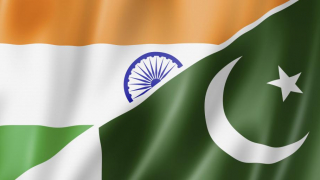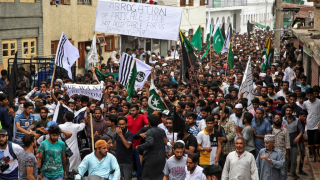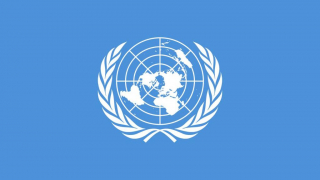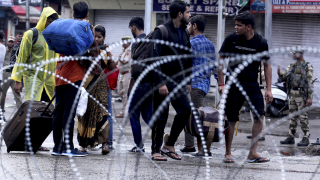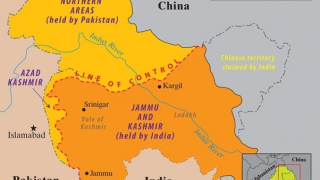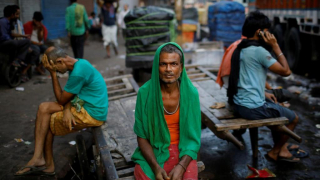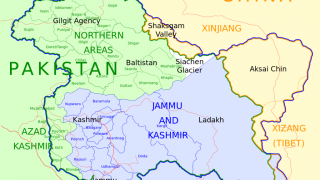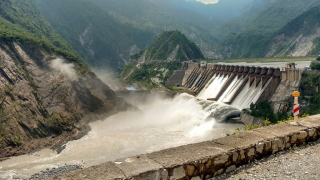The Great Land Grab and Demographic Changes: Disempowering Kashmiris in IIOJ&K
Under the leadership of Prime Minister Narendra Modi and the ruling Bharatiya Janata Party (BJP), the Indian state is experiencing a sharp rise in human rights abuses. Driven by a Hindu nationalist agenda and widespread support for Hindutva ideology, Modi’s government has implemented policies that have significantly undermined the rights of minorities, particularly Muslims. Modi’s policies, such as the enforcement of the Citizenship Amendment Act in 2020, seek to demonize marginalized minorities, especially the Muslim community. Furthermore, the Modi government has systematically subjugated civil society. Since 2016, the Indian government has abolished or postponed the renewal of licenses for various civil society organizations (CSOs) under the Foreign Contributions (Regulation) Act (FCRA). Authorities have implemented various draconian laws related to counter-terrorism and national security to harass, threaten, and silence human rights defenders who criticize government policies, often labeling them as 'anti-national'
Recently, a report titled "Your Land is Our Land: India’s Land Rights Violations in Kashmir" was published by the International Federation for Human Rights (FIDH). The report highlights the Indian government's human rights violations resulting from the legal changes enforced in Jammu and Kashmir since the revocation of special status. On August 5, 2019, the Indian government abrogated the special status of Jammu and Kashmir (J&K), renouncing the constitutional protections granted to Kashmiris under Articles 370 and 35A. J&K was divided into two Union Territories: Jammu and Kashmir and Ladakh, bringing them under the direct rule of the central government. More than 400 laws were enforced, changing land reforms that had previously facilitated the redistribution of land to landless farmers. However, due to these legal changes, it has become easier for the government to confiscate land for infrastructure and investment schemes.
In January 2023, the Jammu and Kashmir (J&K) administration initiated an anti-encroachment drive, resulting in land seizures and the eviction of thousands, which has led to extensive property destruction and serious human rights violations. These land grabs have also permitted an increased military presence in J&K, leading to further displacements of local populations. Native and nomadic communities, particularly the Gujjar and Bakerwal, have faced significant evictions and loss of traditional lands. Moreover, the state's promotion of Hindu religious pilgrimages has contributed to environmental degradation while providing minimal economic benefits to local residents.
This widespread land acquisition forms part of a broader strategy aimed at altering the demographic landscape of Kashmir. By encouraging the influx of external businesses and industries, the Indian government appears determined to change the demographic status of this internationally recognized disputed territory. Such actions risk causing substantial demographic shifts that could undermine the identity and rights of the indigenous population. The ongoing land grab and resource exploitation not only threaten the environment but also jeopardize the core of Kashmiri identity. The introduction of external corporate entities receiving extensive land allocations may result in cultural erosion and socioeconomic displacement for local communities.
India persists in its attempts to change the Muslim identity of the Valley through the delimitation process, primarily intended to benefit the BJP. Additionally, the Indian government has granted electoral rights to non-locals, predominantly non-Muslims, in Indian-occupied Jammu and Kashmir (IIOJK). This extension of voting rights to non-locals seeks to alter the demographics of this Muslim-majority region, effectively diminishing the Muslim population to a minority status. This initiative is regarded as a form of demographic apartheid, as the inclusion of 93,000 new non-local voters is viewed as a strategy to shift the electoral balance in favor of the BJP.
The gerrymandering of six constituencies has expanded Hindu-majority representation from 37 to 43, thereby bolstering Hindu voter influence. Furthermore, predominantly Muslim areas in Jammu, such as Rajouri and Poonch, have been reassigned to the Anantnag constituency, which undermines the Muslim majority in those regions. The Indian government has encouraged settlers in Jammu by allowing those who have lived there for a year or more to register as voters. To fully leverage this coercive initiative, eligible residents must provide government documents as proof of residency, while those without documentation face home verification.
Kashmiris contend that the revocation of the region's semi-autonomous status and the subsequent legal changes aim to alter the area's demographic composition. The Modi administration has violated the fundamental rights of the Kashmiri people by unlawfully abrogating Jammu and Kashmir's special status and implementing the Jammu and Kashmir Grant of Domicile Certificate Rules, 2020. This controversial domicile law permits non-locals to register for domicile certificates in the territory and grants citizenship rights to any Indian residing in the region for over 15 years. Additionally, new legislation has been introduced to allow any Indian citizen to purchase land in the area.
Through its "land for the landless" initiative, the Modi government has allocated five Marla of land to 9,000 individuals, mostly Hindus. However, the distribution of domicile certificates to non-locals is viewed as part of a troubling strategy aimed at undermining the identity of Kashmiris and diminishing IIOJK’s Muslim majority. In the ongoing land acquisition campaign, millions of acres comprising both agricultural and forest land have already come under the unlawful control of the Indian army and paramilitary forces. Currently, Indian forces occupy 53,353 hectares in IIOJK. As of January 2023, the government has started soliciting applications from outsiders for the allotment of 336 flats, with plans to distribute 10,000 houses to non-Kashmiris.
Amendments to the Jammu and Kashmir Development Act have conferred extensive powers upon the Indian armed forces, enabling them to seize any land they consider "strategically important." Furthermore, properties belonging to Muslims have been appropriated for the construction of Hindu temples. There have been reports of Hindu extremists invading mosques and coercing worshippers to chant slogans such as "Jai Shri Ram." These actions reflect a blatant disregard for the rights of the Muslim community and a deliberate attempt to cultivate Hindu support in the Valley.
India's actions violate United Nations resolutions regarding Kashmir, resulting in catastrophic repercussions for the already oppressed Kashmiri population and posing a risk of regional destabilization. The Modi government seems to be adopting an Israeli model of illegal occupation, viewing settler colonialism as a means to resolve the Kashmir dispute. This entire operation, which is considered invalid and illegal under UN mandates, seeks to alter the demographic composition of the occupied territory. Despite facing condemnation from the UN Human Rights Council, Amnesty International, and various other human rights organizations for serious violations, India has displayed a blatant disregard for its commitments to international norms and treaties. The international community must take heed of the ongoing human rights abuses in IIOJK and hold India accountable for its actions.



